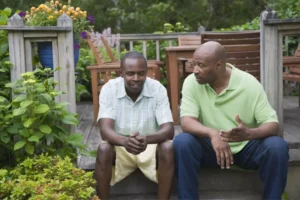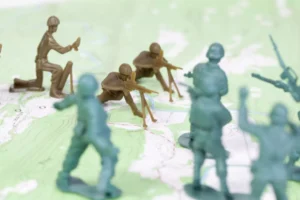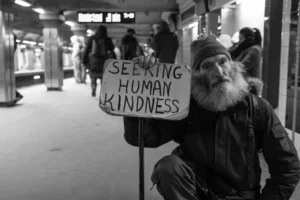When I was 14 years old, I got into a spat with my dear friend Erin Myers, thus beginning a one-month standoff between us in which we both refused to call or otherwise speak to one another. That standoff was interrupted the day after school on May 26, 1994, when she pulled out in front of an 18-wheeler and died on impact.
The days and months following her death were a whirlwind of guilt, depression and anger, during which I felt completely misunderstood by all but Erin’s mother and a handful of her closest friends. And during that dark period, one thing that angered me the most was when high school friends who didn’t know Erin would say, “I know exactly how you feel.”
I didn’t verbally rip into my friends when they would make those comments — but I wanted to. Of all the things they could think of to say, nothing was less helpful than telling me that they knew how I felt. They didn’t. They had no idea, and every shallow comment to the contrary just left me feeling frustrated, isolated and misunderstood.
I wish I could say that teenagers are the only ones who claim the ability to understand the feelings of every hurting human being they meet, but adults say that kind of annoying stuff all the time. I can’t throw stones, though, because the truth is, for a large part of my adult life I have done the same thing when it comes to race.
The Plank in My Eye
Seriously, this is embarrassing to admit, but I remember countless times in the past when I assured people that I understood racial discrimination because I went to a high school where I got bullied for reasons that had nothing to do with race. There were also times when a minority member would talk about racial profiling, and I would unhelpfully refer to that one time — about 17 years ago — when a black cop pulled me over in Mississippi for no reason and was rude. Oh yeah, believe me. I totally get it.
I suppose it was probably during my time at the University of Mississippi Law School that I began to rethink my ability to truly empathize in this area. I made friends with a number of black students, and my mentor was a black law professor. We began talking about race in a way I hadn’t before, and the thing that was different was that I actually started listening.
These new friends were model citizens who had been conspicuously followed by department store employees, treated like unwelcome guests in restaurants, and derided by white teachers in school. They were people like my friend Erica, who was studying in the Ole Miss Black Law Student Association office on game day when a white woman came in from tailgating and told Erica that the ladies’ room was out of toilet paper. Erica was confused and didn’t know how to respond, so the woman repeated her request, still assuming Erica was the cleaning lady. When Erica told the woman that she was a law student, the woman smirked doubtfully and walked away in a huff.
Stories like Erica’s aren’t anomalies; they are part of the life experience of people of color, part of what they have come to expect in a world filled with the racism of low expectations, which isn’t confined to the usual suspects. Sometimes it’s the bleeding heart liberal who approaches minorities with paternalistic condescension, and sometimes it’s the evangelical pastor who makes racially-tinged comments in the middle of an election and doesn’t even realize how offensive it is. Racial minorities face this unfriendly world so often that it becomes easy to make equally negative, sweeping assumptions about white people — even if they may be wrong part of the time. And so the negative cycle continues.
I Don’t Get It
In the 10 years since law school, I’ve done civil rights work on behalf of a wide range of racial minorities; I’ve married into a Hispanic family; I’ve made friends from a wide range of racial backgrounds, and I’ve moved into a neighborhood where, as a white male, I’m in the vast minority. So there’s a temptation to assume I’ve got some great insight to offer people of color about how I now truly understand where they’re coming from. Well, let me make something clear, once and for all: I don’t know how they feel — and in fact, I don’t have a clue.
I don’t wake up every day with that extra amount of melanin in my skin that triggers all kinds of unspoken assumptions about my criminal propensities, aspirations, and level of education. I’ve never been frisked by police officers when I did absolutely nothing wrong. In fact, as a general rule, I live in a world where my blondish hair, blue eyes, and fair skin lead to the assumption that I can be trusted to be a productive citizen at all times.
Some white readers will bristle at this and say, “The reason people make negative assumptions about black men is because they’re more frequently arrested for criminal behavior.” Great — so I guess my friend Jonathan, who’s a brilliant, black attorney in D.C., is supposed to feel better when he gets randomly pulled over for driving while being black.
Stinks for you, man. Just hang in there, and I’m sure they’ll figure out you’re just a regular, decent human being soon enough (and make sure and keep your hands on the steering wheel when the officer approaches — you don’t want to scare the officer!).
Maybe Most of Us Don’t Get It
This is all I’m proposing for those of us who are white and want to see some progress in this complicated morass of racial tension: Let’s stop and imagine, for just 10 minutes or so, that we might not understand what it means to grow up as a member of an American racial minority. Then let’s stop and consider what we might be able to learn from getting genuinely curious and asking a person of color about their experience. That’s not going to come easily, because it’s not in our nature to be aware of lifelong, favorable conditions to which we naturally feel entitled.
Now to be clear, I’m not saying that white folks have zero capacity to feel empathy for racial minorities. I’m saying that we have a limited capacity that will only expand as we choose to be curious about racial minorities’ unique American experiences, both positive and negative, rather than assuming we probably know where they’re coming from.
The reason why it’s so important for us to recognize our ignorance is because otherwise, we won’t realize how much we have to learn. If we don’t think we’ve got anything to learn, we won’t realize how badly we need to listen. And if we fail to listen, it’s a whole lot less likely that we’re ever even going to begin the honest conversation about race that our country so desperately needs.
Copyright 2014 Joshua Rogers. All rights reserved.











